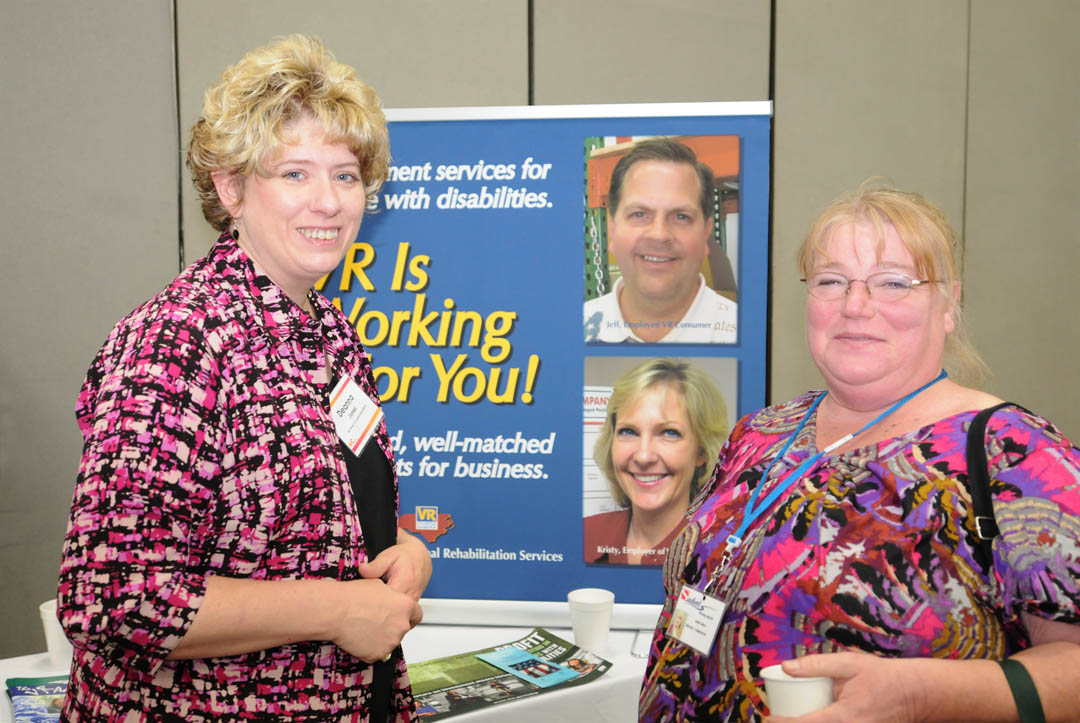College News
CCCC's Triangle South Workforce Development Board leads in unemployment fight
Notice: This article is older than 12 months. Names, contact information, programs, titles, etc. might have changed. If you have any problems please call the main college number, 1-800-682-8353, and we will be happy to direct you accordingly.

click image to enlarge ⊗
Deanna Jones (left), business relations representative for the Siler City office of the N.C. Division ... (more)

click image to enlarge ⊗
Rosalind Cross directs CCCC's Workforce Development Department, which is part of the college's Economic ... (more)

click image to enlarge ⊗
Jean Fields (left), of Lee County Youth Services, talks to Cashon Hooker, of Harnett County, about ... (more)

click image to enlarge ⊗
The Triangle South Workforce Development Board at Central Carolina Community College received the ... (more)
04.30.2012 • College & Community
SANFORD - Getting people trained for success in the workforce is a major challenge in which Central Carolina Community College is proud to be a leader, according to Dr. Bud Marchant, college president.
"That leadership includes being the first community college in North Carolina to direct a workforce development board," he said.
The Triangle South Workforce Development Board, one of 23 WDBs in the state, has provided workforce development and support services in Chatham, Harnett, Lee and Sampson counties since 2009. In 2011, it served almost 300 adults and more than 160 youth.
The TSWDB works on an annual budget of $1.9 million, most of it federal Workforce Investment Act (WIA) funding, to provide programs for adults, dislocated workers and youth.
The adult program addresses the needs of underemployed or unemployed individuals in need of training services. The dislocated worker program serves those who have been terminated, laid-off, or notified of a plant closure or reduction in force (RIF) through no fault of their own. The youth program addresses the needs of disadvantaged youth ages 14 to 21. TSWDB also provides incumbent worker grants and on-the-job training.
"Our goal is to combine area employment, training and supportive services into a consumer-based, market-driven system that meets the needs of job seekers and employers," said Bud Schlademan, TSWDB chair. "In our ongoing efforts to achieve this goal, we now have five JobLink Career Centers in our four-county area. These provide convenient locations for job seekers, potential employers and support programs to interact."
The JobLink Career Centers offer one-stop skills assessments, job search and placement. They contract with agencies, such as the Department of Employment Services, to provide services. They also partner with educational institution programs, such as CCCC's College and Career Readiness, Industry Services, Human Resources Development, and Continuing Education, to provide adult basic education, continuing education, workforce readiness, and workplace training to clients.
Rosalind Cross directs CCCC's Workforce Development Department, which is part of the college's Economic & Community Development Division, and is also director for the Triangle South WDB.
"The vision of TSWDB goes hand-in-hand with the vision of the college," she said. "TSWDB's vision is to provide an efficient labor market that offers well-paying jobs for area residents, provide a well-educated and well-trained workforce for area employers, and attract new businesses and facilitate economic development, while the college serves as a catalyst for personal, community, and economic development by empowering people through education and training.
"It makes sense to have workforce development under the college's purview," she added, "because it's a community effort that is geared towards getting individuals trained for a brighter future."
Workforce Development/WIA provides funding to train people for in-demand occupations that offer reasonably stable, secure, and family-supporting employment, such as dental assisting, health care, heating/AC mechanics, legal occupations, and industrial mechanics.
Cross is herself a former dislocated worker from Guilford Mills, Inc. She enrolled at CCCC with help through the WIA program and earned an A.A.S. in Business Administration. She then went on to earn a Bachelor of Science in Human Resources Management-Business Administration and a Master of Business Administration from Franklin University.
"I'm excited about the opportunity to help the community," Cross said. "It feels good to help others who are in the position I was in. The WIA program works for individuals that take advantage of the services that are offered. Under the leadership of board Chairman Bud Schlademan, TSWDB expects to reach new levels of success with continued focus on the community and local area business."
In addition to assisting with the costs of books, tuition, and fees associated with training, WIA can also provide supportive services such as assistance with the cost of child care, mileage reimbursement, purchase of tools and uniforms, etc.
Karen Nelson Frazier came to the Lee County Employment Security Commission in 2008 after Pilgrim's Pride plant, in Siler City closed, taking her job with it. She learned that she could go back to school under a WIA program. Frazier earned a degree in Medical Office Administration from CCCC and now has a good job. She said she is very grateful for the opportunity she was given through WIA.
The TSWDB also provides Incumbent Workforce Development Program grants to employers to upgrade the skills of their employees.
Schlademan and Cross said the TSWDB has been very successful. It:
- won a $50,000 Incentive Award from the N.C. Division of Workforce Solutions for goal achievement.
- partnered with the Hispanic Liaison of Chatham County for a $40,000 Rural Center for Community Mobilization Innovation Award to hire a coordinator to help people find employment or entrepreneurship opportunities.
- received the Governor's Workforce Development Award for Outstanding Innovative Partnership for working with Sampson Community College on a refrigeration training program.
- obtained a $14,075 Incumbent Workforce Development Grant for Lee County Industries for workforce lay-off aversion and skill attainment.
- hosted a successful Business Services 2012 event that showcased its business services and the area JobLink Career Centers, as well as enabling businesses to network.
The TSWDB has a Youth Council to provide input for youth education and employment programs. Cross said many youth are at risk and wouldn't be able to overcome the barriers they face without the assistance of the WIA programs.
Ariel Everette enrolled in the WIA Youth Program in 2010 as a rising high school senior. She completed 20 hours of academic enrichment through CCCC and various activities designed to encourage responsibility and positive behaviors. She then worked in the Summer Employment Program as an office/media assistant at a Harnett elementary school and decided she wanted to teach elementary school. Everette is now attending UNC-Greensboro. Everette said the WIA Youth Program helped her become more focused and prepared for college.
Other programs are also benefiting youth, such as the "On the Brink of Greatness" youth rally that attracted about 120 from the four-county area to hear motivational speakers.
The N.C. Department of Commerce (www.nccommerce.com), oversees all the workforce development boards in the state through its Division of Workforce Solutions. The programs are funded primarily by the federal Workforce Investment Act of 1998, the nation's principal workforce development legislation, according to the Department of Commerce.
"I'm excited about all of the opportunities that we, the Triangle South Workforce Development Board, can offer to the community," Cross said. "I'm excited about the team I work with and feel that, collectively, we are contributing to the community and to the workforce by enhancing the quality of life for our participants and helping to stabilize the workforce for the employers - that's what it's all about."
Categories
- Admin, Faculty & Staff Category
- Arts & Entertainment Category
- Clubs Category
- College & Community Category
- College General Category
- Continuing Education Category
- Curriculum Programs Category
- Distance Education Programs Category
- Facilities/Buildings Category
- Finances Category
- Foundation Category
- Graduations Category
- Lee Early College Category
- NCCCS Category
- SGA Category
- Special Events Category
- Sports Category
- Students/Graduates Category
- Uncategorized Category
Archives

